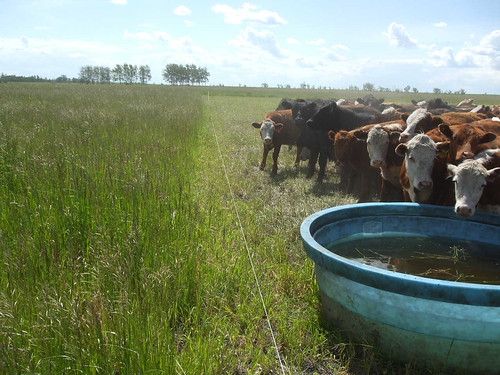Allen Savory said the three words most men in this country have been longing to hear for years, "eat more meat." During his TED talk, How to fight desertification and fight climate change, Savory insists that the answer to the global issue of desertification is Holistic Management. By concentrating herds of animals like cattle or sheep, and allowing them to graze, he believes this will rejuvenate soil and provide healthy grasslands all while providing food for people who need it. Is eating meat the answer to all our environmental problems? If so there are going to be a lot of angry vegans out there.
Desertification is a major problem that most people don't realize is even happening. According to the UN, "it is the persistent degradation of dryland ecosystems by human activities-including unsustainable farming, mining, overgrazing and clear-cutting of land-and by climate change." When the top protective layer of grasses and trees are removed from the soil, it becomes loose and unstable and is highly suseptiable to wind and water erosion. After this precious topsoil is washed away all that is left is an infertile mix of dust and sand. Worldwide desertification could displace almost 50 million people in the next 10 years.
Savory states that with strict management of herds and land we can actually use cattle and other grazing animals to bring back wild grasslands. By drastically increasing the size of a herd, by the thousands, what Savory calls "mimicking nature." Here the animals will urinate and defecate all over the ground, releasing nutrients into the soil and making it healthier. Better soil will support plants, and any seeds that may be passed through the animals could have a chance of being planted and survive. The key to this is that the animals must keep moving, so the material under them could be constantly turning over and releasing healthy nutrients. By recreating these grasslands Savory thinks we can create enough carbon absorption to offset the increased methane production from cattle and also halt global warming.
As you can imagine, this is very controversial. James McWilliams' article on slate.com titled, All Sizzle and No Steak, says that Savory's theory is not only wrong, it's dead wrong. McWilliams discusses some of the results from Savory's test farms. And they don't all mimic the happy family pictures seen in his TED talk. Stating that during Savory's Charter Grazing Trials the animals actually became sick and that some lost so much weight that it compromised the animals profitability. Also, that the trials took place in "a freakishly high rainfall with rates exceeding the average by 24% or more." It seems that even with a little help from all the rain, Savory was unable to produce the numbers he had predicted.
While I think that Savory has a good theory, I don't believe that it could work on the large scale he claims. The plan is so much more involved than just putting a bunch of animals on a seemingly dead piece of land. There are a lot of caveats to this method, and it's a new way of farming and treating the land. I guess it just seems to me that it's another factory farm technique, instead of being inside the cattle are cramped together in a field. For this system to work there has to be a strict line of equilibrium where the amount of cattle do not negatively affect the ecosystem they are trying to build. Like all things in life, there is a tipping point. After that point is passed animals become unhealthy and unprofitable and the land does not support the life it is supposed to.
However, the theory that creating grasslands, or increasing the plant material in areas suffering from desertification is a popular one. Debra C. Peters, et. al studied the effects that increased greenery had on precipitation events. In a nutshell she said that if you plant it, the rain will come. Just like most of our environmental issues there is never one answer. Just because the same thing is happening all over the world, doesn't mean there is one single answer to solve it. Every ecosystem that is affected has it's different problems and solutions. It's up to us to keep our minds open to all ideas on how to fix the world.
Allan Savory TED Talk
UN Desertification Page
Allan Savory Animation
James McWilliam's Article
Debra C. Peters et. al
Savory Institute




No comments:
Post a Comment